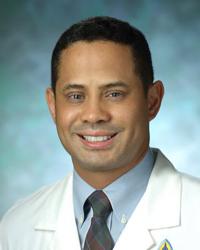Research Lab Results
-
Venkataramana Sidhaye Lab
We are interested in basic and translational studies looking at the effects of environmental exposures, including cigarette smoke and electronic cigarettes, on lung epithelial function. We are focused on mechanisms to reverse injury to promote lung health, primarily in the context of Chronic Obstructive Pulmonary Disease (COPD). -
Kendall Moseley Lab
Research in the Kendall Moseley Lab is focused on the interplay between type 2 diabetes, aging and osteoporosis. We also study the function of bone stem cells in the regulation of bone remodeling.
-
The Koliatsos Lab
Founded in the late 1980s, our Lab explores the fundamental mechanisms of neural responses to traumatic and degenerative signals and works to identify targets for treating injury/degeneration with small molecules, peptides and cells. We currently focus on traumatic and degenerative axonopathies as they occur in traumatic brain injury (diffuse axonal injury), neurodegenerative diseases i.e. Alzheimer's disease and other white matter conditions, e.g. hypoxic ischemic encephalopathy, demyelination. We are especially interested in the role of the MAPK cascade of injury, NAD metabolism and SARM1 signaling and their convergence on Wallerian degeneration. -
Kunisaki Lab
The Kunisaki lab is a NIH-funded regenerative medicine group within the Division of General Pediatric Surgery at Johns Hopkins that works at the interface of stem cells, mechanobiology, and materials science. We seek to understand how biomaterials and mechanical forces affect developing tissues relevant to pediatric surgical disorders. To accomplish these aims, we take a developmental biology approach using induced pluripotent stem cells and other progenitor cell populations to understand the cellular and molecular mechanisms by which fetal organs develop in disease.
Our lab projects can be broadly divided into three major areas: 1) fetal spinal cord regeneration 2) fetal lung development 3) esophageal regeneration
Lab members: Juan Biancotti, PhD (Instructor/lab manager); Annie Sescleifer, MD (postdoc surgical resident); Kyra Halbert-Elliott (med student), Ciaran Bubb (undergrad)
Recent publications:
Kunisaki SM, Jiang G, Biancotti JC, Ho KKY, Dye BR, Liu AP, Spence JR. Human induced pluripotent stem cell-derived lung organoids in an ex vivo model of congenital diaphragmatic hernia fetal lung. Stem Cells Translational Medicine 2021, PMID: 32949227Biancotti JC, Walker KA, Jiang G, Di Bernardo J, Shea LD, Kunisaki SM. Hydrogel and neural progenitor cell delivery supports organotypic fetal spinal cord development in an ex vivo model of prenatal spina bifida repair. Journal of Tissue Engineering 2020, PMID: 32782773.
Kunisaki SM. Amniotic fluid stem cells for the treatment of surgical disorders in the fetus and neonate. Stem Cells Translational Medicine 2018, 7:767-773

-
Laboratory for Fetal and Neonatal Organ Regeneration
Researchers in the Laboratory for Fetal and Neonatal Organ Regeneration in the Department of Surgery at the Johns Hopkins School of Medicine are studying whether cellular reprogramming, stem cells, and ex vivo modeling can be applied to improve organ regeneration in pediatric surgical patients. To execute these aims, the lab collaborates with developmental biologists and biomedical engineers throughout the country and employs cutting-edge molecular strategies and pre-clinical animal models.
-
Neuroengineering and Biomedical Instrumentation Lab
The mission and interest of the neuroengineering and Biomedical Instrumentation Lab is to develop novel instrumentation and technologies to study the brain at several levels--from single cell to the whole brain--with the goal of translating the work into practical research and clinical applications. Our personnel include diverse, independent-minded and entrepreneurial students, post docs, and research faculty who base their research on modern microfabrication, stem cell biology, electrophysiology, signal processing, image processing, and integrated circuit design technologies. -
O'Rourke Lab
The O’Rourke Lab uses an integrated approach to study the biophysics and physiology of cardiac cells in normal and diseased states. Research in our lab has incorporated mitochondrial energetics, Ca2+ dynamics, and electrophysiology to provide tools for studying how defective function of one component of the cell can lead to catastrophic effects on whole cell and whole organ function. By understanding the links between Ca2+, electrical excitability and energy production, we hope to understand the cellular basis of cardiac arrhythmias, ischemia-reperfusion injury, and sudden death. We use state-of-the-art techniques, including single-channel and whole-cell patch clamp, microfluorimetry, conventional and two-photon fluorescence imaging, and molecular biology to study the structure and function of single proteins to the intact muscle. Experimental results are compared with simulations of computational models in order to understand the findings in the context of the system as a whole. Ongoing studies in our lab are focused on identifying the specific molecular targets modified by oxidative or ischemic stress and how they affect mitochondrial and whole heart function. The motivation for all of the work is to understand • how the molecular details of the heart cell work together to maintain function and • how the synchronization of the parts can go wrong Rational strategies can then be devised to correct dysfunction during the progression of disease through a comprehensive understanding of basic mechanisms. Brian O’Rourke, PhD, is a professor in the Division of Cardiology and Vice Chair of Basic and Translational Research, Department of Medicine, at the Johns Hopkins University. -
Fu Lab
The Fu Lab is a basic research lab that studies zinc transport, with a particular focus on which step in the zinc transport process may be modulated and how. Dr. Fu's lab uses parallel cell biology and proteomic approaches to understand how these physiochemical principles are applied to mammalian zinc transporters and integrated to the physiology of pancreatic beta cells. This research has implications for understanding how zinc transport is related to diabetes and insulin intake. -
Frederick Anokye-Danso Lab
The Frederick Anokye-Danso Lab investigates the biological pathways at work in the separation of human pluripotent stem cells into adipocytes and pancreatic beta cells. We focus in particular on determinant factors of obesity and metabolic dysfunction, such as the P72R polymorphism of p53. We also conduct research on the reprogramming of somatic cells into pluripotent stem cells using miRNAs.
-
In-vivo Cellular and Molecular Imaging Center
The In-vivo Cellular and Molecular Imaging Center conducts multidisciplinary research on cellular and molecular imaging related to cancer. We provide resources, such as consultation on biostatistics and bioinformatics and optical imaging and probe development, to understand and effectively treat cancer. Our molecular oncology experts consult on preclinical studies, use of human tissues, interpretation of data and molecular characterization of cells and tumor tissue.






